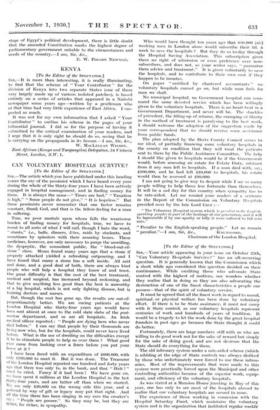CAN VOLUNTARY HOSPITALS SURVIVE? [To the Editor of the SPECTATOR.]
Sin,—The article which you have published under this heading voices the cry of the pessimist which I have heard every year during the whole of the thirty-four years I have been actively engaged in hospital management, and in finding money for them. It is always the same—" Times are bad," " Taxation is high," " Some people do not give," " It is hopeless." But these pessimists never remember that one factor remains constant, thank God, and that is the fellow-feeling for a man in suffering.
True, we poor mortals upon whom falls the wearisome burden of finding money for hospitals, true, we have to resort to all sorts of what I will call, though I hate the word, `• stunts," i.e., balls, dinners, files, raids by students, and sometimes by spinsters with their amazing boxes. These medicines, however, are only necessary to purge the unwilling, the dyspeptic, the somnolent public, the " blood-out-of- stone " class. Moses found many years ago that a stone if properly attacked yielded a refreshing outpouring, and I have found that many a stone has a soft inside. All said and done, and a good deal of both, there are always kind people who will help a hospital they know of and trust. Our great difficulty is that the cost of the best treatment, medical and surgical, has increased beyond reckoning, and that to give anything less good than the best is unworthy of a big hospital, which is not only fighting disease, but is training doctors and nurses.
But, though the cost has gone up, the results are out-of- proportionately better. We are curing patients at the London Hospital who thirty-four years ago would have been sent almost at once to the cold slate slabs of the post- mortem department, and so are all hospitals. An Irish medical officer reported : People are dying here who never died before." I can say that people by their thousands are living now who, but for the hospitals, could never have lived before. What is the use of dwelling on the difficulties except it be to stimulate people to help us over them ? What good ever came from looking over a fence before you put your horse at it ?
I have been faced with an expenditure of £600,000, with only £100,000 to meet it. But it was done. The Treasurer of the London Hospital reported one hundred and forty years ago that there was only is. in the bank, and that " Halt ! " must be cried. Fancy if it had been We have gone on, we have spent 6 millions at the London Hospital in the last thirty-four years, and are better off than when we started. We are only £80,000 on the wrong side this year, and a godsend by way of gift or legacy may put that right. And all the time there has been ringing in my ears the croaker's er!' " People are poorer." So they may be, but they are richer, far richer, in sympathy.
Who would have thought ten years ago that 890,000 (sic) working men in London alone would subscribe their 3d. a week to save the hospitals ? But they do so to-day through the Hospital Saving Association. This subscription gives them no right of admission or even preference over non- subscribers, and does not, as your writer says, guarantee them advice and treatment." It is given voluntarily to save the hospitals, and to contribute to their own cost if they happen to be inmates.
On paper " certified by chartered accountants " we voluntary hospitals cannot go on, but while man feels for man we shall.
No municipal hospital, no Government hospital can com- mand the same devoted service which has been willingly given to the voluntary hospitals. There is no heart-heat in it Government Department, and never will be. The shackles of precedent, the filling-up of returns, the cramping of liberty in the method of treatment is paralysing to the best work. I should welcome the adoption of the suggestion made by your correspondent that we should receive sonic assistance from public funds.
The plan adopted by the Herts County Council seems to me ideal, of partially financing some voluntary hospitals in the county on condition that they will treat the patients sent to them by the Public Assistance Committee. The help I should like given to hospitals would be if the Government would, before assessing an estate for Estate Duty, subtract from it any sum left to hospitals. If a man died with, say, £100,000, and he had left £10,000 to hospitals, his estate would then be assessed at £90,000.
I am not going to give way to despair while I see so many people willing to help those less fortunate than themselves. It will be a sad day for this country when sympathy has to be rate-aided. Let me remind your readers of a sentence in the Report of the Commission on Voluntary Hospitals presided over by the late Lord Cave :—
" The Voluntary Hospital system which is peculiar to lie n)othi.de• speaking peoples is part of the heritage of our generation, and it will be lamentable if by our apathy or folly it were suffered to fall into
" Peculiar to the English-speaking people." Let us remain " peculiar."—I am, Sir, &c., KNUrnPogr7, Chairman of the London Hospital.










































 Previous page
Previous page